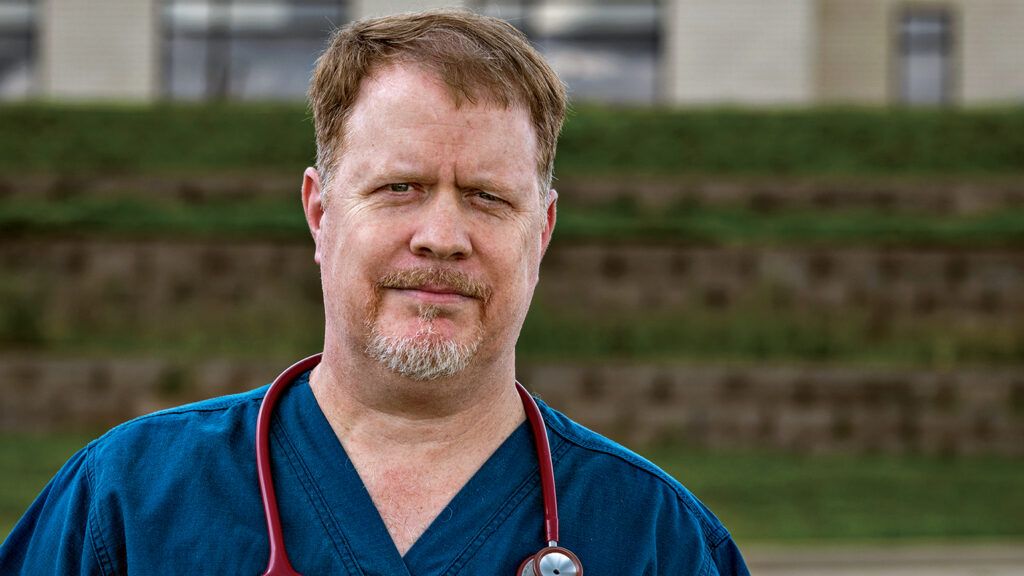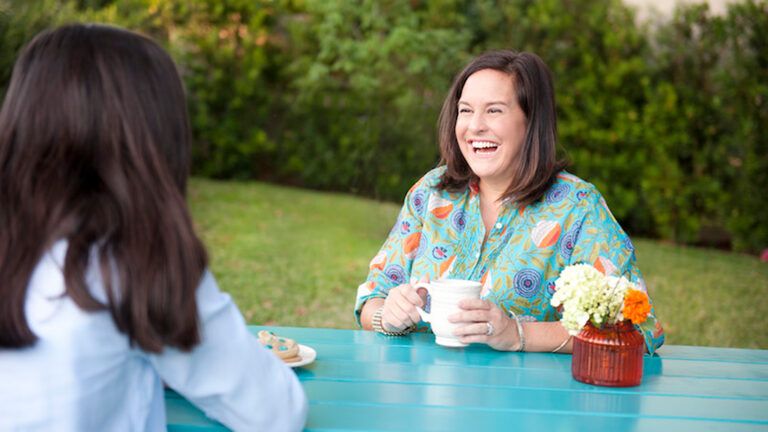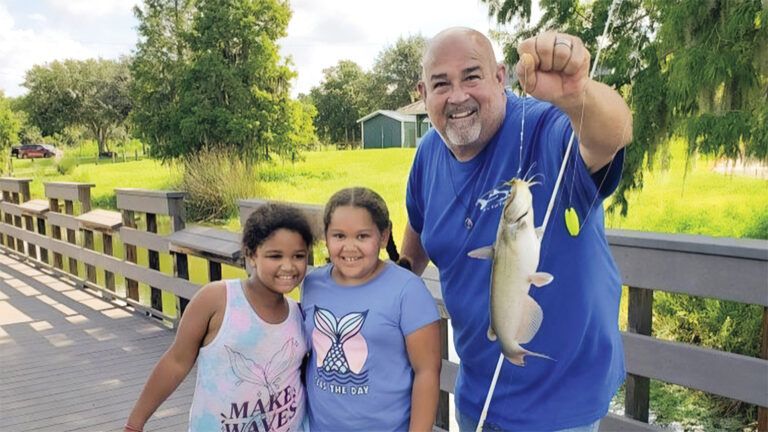I couldn’t find my stocking cap. That’s how it all started. Though looking back on that day, I can see that isn’t what stands out. The weird thing is, I was only an observer to everything that happened afterward. But nothing would ever be the same for me again.
December 6, 2007. I’d rushed home from my job as a department manager at Walmart. I’d been there 11 years and, at 37, planned on retiring there. For a guy who never went to college, I felt lucky to have a good-paying job and wanted to hang on to it. I’d always made the safe choice in everything I did. All this talk about God having a plan. I wasn’t sure about that—at least for me. Better not to take chances.
The roads were starting to ice up. I was going out again to work on our church float for the Christmas parade. But where was my cap? Ah, yes, there it was, tossed in the closet. It would be getting dark soon. I gave my wife, Melissa, a kiss and headed out the door.
Traffic was busy on Highway 63. A quarter mile ahead was a bridge that spans Indian Creek. Suddenly everything came to a halt. I edged forward. Just before the bridge, I saw it. A sheriff’s deputy’s Crown Vic on the right side of the road. Crumpled. A few feet away was a full-size pickup. Damaged but not as badly. Must have been a horrible impact. The icy bridge.
I parked on the nearest crossroad and ran to the patrol car. I peered through the driver’s side window. Two officers in front, a guy behind the wheel and a woman in the passenger seat. Two prisoners in the back, a woman and a man. All unconscious. A grisly scene. I felt sick. Worse, I felt helpless.
A woman came up. “I’m a nurse,” she said.
Thank God! “What do we do?” I asked her.
“There’s not much we can do. We don’t have the equipment,” she said. “I called 911.” I turned to the car. The driver was moving. “Stay still,” I said, trying to keep my voice calm and firm. “Help is coming.” I wasn’t sure he heard me, but he didn’t budge. “It’s going to be okay.”
I went to the pickup truck. The driver and his young son were conscious but in shock. “Stay still,” I repeated. By then, the paramedics had arrived. They used the Jaws of Life to open the patrol car. They removed the victims with such skill and were so cool under pressure. Then everyone was on the way to the hospital.
I said a prayer for the trauma team. Their work was just beginning. Yet I felt strangely numb. No, helpless. I wondered if anyone in the patrol car would survive. It was too late to continue on to church, so I got back in my car and headed home. When I came through the door, Melissa looked startled. “Are you okay?” she asked.
I told her everything. “They were dying, and I didn’t know what to do.”
“You did everything you could,” Melissa said. “If it wasn’t for you looking for your hat, you could have been in the wreck. You could have been killed. Think about that.”
I had no appetite for dinner. I sat on the couch in silence, replaying every moment. The faces of the victims, especially the female officer, so young…
“I’ve got to call Mom,” I finally said. A retired nurse, she might be able to tell me if I’d overlooked something.
“What more could you have done, Paul?” she said. Mom wasn’t one to mince words. “You’re not a paramedic. You’re a manager at Walmart.”
That night, I barely slept. Or the night after that. News coverage didn’t help. The sheriff’s deputy had slid over the center line. The woman in the passenger seat, Laura Whittingham, was a student at the sheriff’s academy and volunteering as a prisoner transport officer. She was 35—two years younger than me—and died at the hospital. Married with young children.
One of the prisoners had died too. The others all pulled through. Laura Whittingham’s death hit me hard. Those poor kids, robbed of their mother. If only I’d been able to help.
If only. My life had a few of those. I’d never needed some deep sense of purpose in my job. I wasn’t cut out to be one of those people. When I was in the fourth grade, my parents had pulled me out of public school and enrolled me in a private school, with barely a dozen students, run by our church. Our household was in a season of chaos, and my parents wanted me in a supportive environment.
Most years, I was the only student in my grade. I struggled with motivation and graduated a year late. I thought there was something wrong with me. My self-confidence evaporated. I passed up all kinds of opportunities. A mission trip to Africa. Pursuing professional training in the performing arts, which I loved. College. I couldn’t imagine pushing myself that hard.
Eventually good things had come my way. I met Melissa, a teacher, and got married. Was hired at Walmart and earned promotions. I’d done all right.
Now I was desperate to make a change. I kept thinking about the paramedics. Finally I brought up the topic to Mom.
“Is that what you want to be doing later in life?” she said. “Climbing in and out of wrecked cars? Why don’t you think about nursing?”
“What?” I said. “You know I didn’t go to college.”
“I wouldn’t suggest it if you couldn’t do it, Paul,” she countered. “You need to start believing in yourself and stop playing it so safe.” Like I said, Mom is blunt.
College? Nursing school? It all seemed too much. Still, I couldn’t ignore the feeling inside me. So I looked into nursing. Because I hadn’t graduated from an accredited school, I would have to get my GED first. And take the ACT exam. All this before I could even apply to college.
“You can’t give up,” Melissa said. “I’ll help you study. Do you ever wonder if God is trying to tell you something? That maybe there is a plan?” If Melissa believed in me and Mom did too, why couldn’t I?
I started college in August 2008 and two years later was accepted into a nursing program. I stayed on part-time at Walmart to help pay the bills. It was a million times harder than I’d even imagined. There were a million times I wanted to quit. But one thing helped keep me going: Laura Whittingham. If only I could have done something.
She’d been a student too, with her own dreams. Occasionally, I tried to contact her family. I’d always come up short. But I never forgot her. Never forgot my feeling of helplessness.
I graduated in 2012—top of my class, no less. A registered nurse! Still I doubted if I could keep everything that I’d learned in my head.
“You’re never going to remember every detail. Nursing is complex,” Mom told me. “What’s most important in nursing is showing you care.”
I was amazed to discover that I was good at it. I too knew about fear and worry. I understood people questioning God. In sharing with patients, I began to feel a presence I had never really experienced.
One day, I was sitting with a family that had just lost a loved one. I knew they were believers. “He didn’t suffer,” I said. “He’s in a much better place, walking on streets of gold.” There was relief, in a way a kind of joy, in the faces of the family, that someone understood.
Not long after that, I went on my first medical mission trip, to The Gambia. Caring for the people there, both adults and children, profoundly affected me. As if God had literally been waiting for me in Africa. Lovingly waiting for me to accept the plan he’d made for my life, a plan I once doubted and now embraced. I knew for certain that God was at work in my life.
Every day, driving to work at the hospital, I passed by the memorial—a simple wooden cross—that had been erected in Laura’s memory. I wondered what had become of her children. I wished I could tell them that their mother hadn’t died alone, how my life had been changed as a result of everything.
One Saturday in June 2017, Melissa and I were heading to town to go shopping. We were running very late, with one unexpected delay after another.
Before the bridge, I glanced reflexively at the memorial. Two young women stood at the cross. “It’s them,” I said.
I parked on the same side road I had more than nine years earlier. Melissa and I walked to the little cross where the young women stood. “Excuse me, are you related to Laura?” I asked.
“Yes, we’re her twin daughters,” one of them said.
“I stopped the night of the accident,” I said. “I was there the whole time with your mother and the others. They were never alone. That day changed my life. I went to college and became a nurse. I’ve always wanted to tell Laura’s family that something good came out of that tragedy.”
The two women, Hannah and Haley, looked at me. “This is a God moment,” Haley said. “We grew up in Oklahoma. This is our first visit to Mom’s memorial.”
“That means a lot,” Hannah added. “Thank you. But did you know we would be here?”
“I didn’t. My wife and I were supposed to be out of town today. This wasn’t part of the plan.” I paused. “Then again, maybe it was.”
For more inspiring stories, subscribe to Guideposts magazine.





